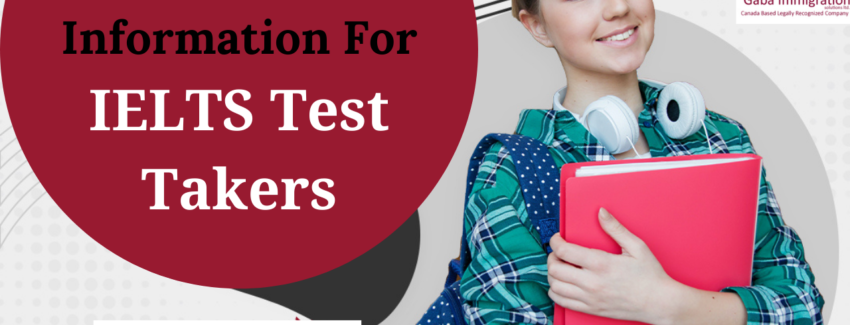This test is very Accessible as well as user-oriented.
The IELTS exam is offered twice a week in more than 140 countries. Tests are organized on Saturdays and Thursdays. If you want to find out test dates in your locality, kindly contact us for details

IELTS is internationally focused in its content. For example, texts and tasks are sourced from books and newspaper articles across the globe. in the Listening test, numerous native-speaker accents are used; and all standard varieties of English language are accepted in test takers’ written as well as spoken responses.
It is a well tried and trusted English Proficiency test
IELTS has been designed by a number of the world’s leading experts in language assessment, and also assisted by an extensive programme of research and validation.
Talking about the level of this test
IELTS is developed to check English language ability across a wide range of levels. There is nothing like a pass or fail in IELTS test. Results are declared in the form of band scores on a scale from 1 (the lowest) to 9 (the highest).
Test format
The test consists of two modules
– Academic and General Training.
IELTS Academic
The individuals who want to pursue their study (graduation or under graduation or post graduation) abroad give Academic test
IELTS General Training
This is designed for those who want to migrate to an English speaking nation (Australia, Canada, New Zealand, UK), as well as for those who wish to train or study at below degree level.
Each organization settles its own requirements. Both Academic and General training may be accepted, but in few cases. If you have any confusion regarding what module should you choose, you can contact the organization in which you want to apply to check requirements for entry.
In this test, you are tested on the basis of four language skills- listening, reading, writing and speaking. The listening and speaking tests are same for both test takers, but there are different reading and writing test for academic and general training.
The test of three modules- listening, reading and writing has been taken on same day, while, the speaking test is held on another day which can be within seven day before or after your LRW test date.
Know the IELTS rules and regulations
Your familiarity with the rules and regulations of ielts test is very important. These are included in the application form in the section of Notice to Candidates and Declaration. You are acknowledging that you have read and understand the IELTS rules and regulations and agree to abide by them when you sign the application form declaration or accept to the conditions online.
Register as soon as possible
The count of candidates who can take the test on a specific day can be limited so it is good to register for a test date with an IELTS test center whenever you feel that you are prepared to take the test.
If you have any particular needs, let your center know.
IELTS gives the facility of a comprehensive service to those candidates who have special requirements, including learning difficulties, visual disabilities, hearing difficulties, medical conditions or infant feeding.

If you need an altered version of the IELTS test, you have to give a notice to the test centre three months prior to your test date in order to prepare the modified version. Special administrative arrangement can also be made if your circumstances require, for illustration, if you have any king of need regarding using any technical product like a screen reader you must give six weeks’ notice to your test centre. If you want to discuss your requirements kindly contact your nearby test centers. Any special arrangements agreed are in accordance with the Joint Council for Qualifications (JCQ).
The four modules of the IELTS test
Listening
· In this module the listening is played for approximately 30 minutes and after that you have 10 minutes to transfer your answer to answer sheet.
· There are 40 questions in this module. There are various kinds of questions types which are used like multiple choice, matching, plan/ map/diagram labelling, form completion, note completion, table completion, flow-chart completion, summary completion, sentence completion, short-answer questions.
· There are 4 sections. Each section contains 10-10 questions.
Section A
In this section, there is a general conversation between two persons about everyday social context like a conversation in an tourist agency.
Section B
In this section, a monologue has been played which can be related to local facilities, recently built park etc.
Section C
In this section, there is a discussion between up to four people set in an educational and training context for example a tutor and two students taking about an assignment or a group of learners planning a research project.
Section D
In this section, a person is talking about an academic subject (e.g. a university lecture).
In this module, various kinds of voices and native accents are used to check the listening ability of candidate.
Skills assessed
A variety of listening skills are evaluated, regarding:
•Ccomprehension of prominent ideas
• Comprehension of accurate data
• Recognising opinions, attitudes and aim of a speaker
• Following the development of an argument.
Marking
Each correct answer receives 1 mark. The IELTS 9-band scale is used to convert scores out of 40.
Whole and half bands are used to report scores.
Reading
This module is of 60 minutes (no extra time for transfer). The total text length is 1870-2,550 words.
ACADEMIC READING
· In this module, there are 40 questions. There are various kinds of questions types which are used like multiple choice, matching information, labeling, form completion, note completion, table completion, flow-chart completion, summary completion, sentence completion, short-answer questions, list of headings, identifying information (True/False/Not Given), identifying a writer’s views/claims (Yes/No/Not Given)
· This module consists of 3 sections. Each section contains 7-10 paragraphs. The passage is taken from books, journals, magazines and newspapers. Texts may consists non-verbal materials like diagrams, graphs and illustrations. If the content includes technical jargon, a brief glossary is included.
General Training Reading
In Section 1, there are two or three short fact-based texts, one of which may be composite (consisting of 6-8 short texts related by topic,

e.g. hotel advertisements). Topics are related to everyday life in a nation where English is spoken.
In Section 2, there are two small accurate texts in which work- related issues are focal point(e.g. applying for jobs, company policies, pay and conditions, amenities of workplace , staff development and training).
In Section 3, there is one longer, more complex text on a topic of general interest.
Authentic notices, advertising, company handbooks, government documents, books, magazines, and newspapers were used to create the texts.
Skills assessed
A variety of reading skills are examined, reading:
• Reading for gist
• Reading for main ideas
• Reading for detail
• Understanding inferences and implied meaning
• Recognizing writer’s opinions, attitudes and purpose
• Following the development of an argument.
Marking
Each correct answer receives 1 mark. The IELTS 9-band scale is used to convert scores out of 40.
Scores are reported in whole and half bands.
Writing
This module is of 60 minutes
Task 1 and task 2 are two separate tasks.
You must compose at least 150 words in task 1.Task 2 requires you to compose at least 250 words.
For academic and general training candidates, Task 1 and Task 2 are distinct.
Academic Writing
In Task 1, you are given a graph, table, chart or diagram and are asked to describe, summarise or explain the information in your own words. You are asked to describe and explain data, describe the various levels of a process, how something works or describe an object or event.
In Task 2, you are asked to write an essay on a given point of view, argument or problem.
The issues are mainly of general interest, and easy so that test takers can easily understand.
Candidates should write responses to Task 1 and Task 2 an academic, semi-formal/neutral style.
General Training Writing
In Task 1, candidates are given a particular situation and are asked to write a letter requesting information or explaining the situation. The letter might be written in a personal or semi-formal/neutral tone.

In Task 2, you are asked to write an essay on a given point of view, argument or problem. The essay can have a more personal tone than the Academic Writing Task 2 essay.
Topics are of general interest.
Skills checked
In both tasks, you are examined on your capability to write a response which is appropriate in terms of:
• Content
• The arrangement of ideas
• The precision and a variety of vocabulary and grammar.
Marking
• Your performance of each task is examined by certified IELTS examiners according to the ielts
• Task Achievement/Response, Coherence and Cohesion, Lexical Resource, Grammatical Range, and Accuracy are the criteria used to grade writing tests.
• Task 2 contributes two times as much as Task 1 to the Writing score.
• Whole and half bands are used to report scores.
Speaking
This module consists of 11-14 minutes
There are three parts of the module
Part 1 introduction and interview (4-5 minutes)
To begin, the examiner introduces himself or herself and asks you to do the same to authenticate your identification. You are asked some general questions on familiar topics by an examiner, e.g. home, family, work, studies and interests.
Part 2 Individual long turn (3-4 minutes)
The examiner provide you a card and you have to talk about a particular topic and which includes points you may cover in your talk. You have one minute to prepare your speech and two minutes to deliver it a pencil and paper is provided to make notes. You have to talk for 1-2 minutes on the given topic. After then, the examiner may ask you one or two questions about the same subject.
Part 3 Two-way discussion (4-5 minutes)
The examiner asks some questions which are related
to the topic of Part 2. These questions allow you to talk about more abstract concerns and ideas.
Skills assessed
A variety of speaking skills are retrieved, regarding:
• The capability to communicate opinions and information on everyday topics and common experiences and situations by answering a range of questions
• The ability to talk for an extended period of time about a specific topic while using acceptable language and organizing ideas in a logical manner
• The able to express and defend one’s viewpoints, as well as to analyze, discuss, and theorize on subjects.
Marking
Throughout the course, you will be graded on your performance test by certificated IELTS examiners according to the IELTS Speaking test assessment criteria (Fluency and Coherence, Lexical Resource, Grammatical Range and Accuracy, Pronunciation). ielts.org/criteria has the public version of the assessment criteria.
Scores are reported in whole and half bands.
About us:
Gaba Immigration is based in Surrey, BC and has successfully helped clients from all over the world. Gaba Immigration is a full range bilingual immigration consulting firm and it provide expert advice and representation to clients in Canada and worldwide.

